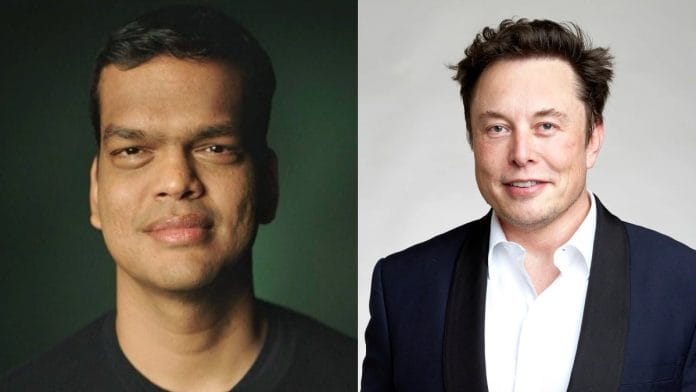New Delhi: Following the ouster of Parag Agrawal as Twitter CEO, another Indian-origin technology executive has entered the blue bird’s nest, though in a different capacity. Sriram Krishnan, a B. Tech graduate from Chennai’s Anna University and a crypto investor, has made it public that he is working at Twitter with its new owner, Elon Musk.
“Now that the word is out: I’m helping out @elonmusk with Twitter temporarily with some other great people”, Krishnan tweeted Monday, sending Indian media in all vernaculars into a frenzy.
“One Indian leaves, another steps up”, wrote Republic.
“Who is this Indian-origin Sriram Krishnan, and why Elon Musk will need his help”, asked Amar Ujala, a Hindi daily.
“Sriram Krishnan is in Elon Musk’s team”, read a headline in Malayalam daily Manorama.
On 28 October, Musk closed his $44 billion deal and took over the microblogging site as its new CEO. Notably, Parag Agarwal was appointed as the first Indian-origin CEO of Twitter in November 2021.
Krishnan added in the same tweet, “I (and a16z) believe this is a hugely important company and can have great impact on the world and Elon is the person to make it happen.”
A popular Silicon Valley venture capital firm, ‘a16z’ — short for Andreessen Horowitz — is one of the firms that helped fund Musk’s $44 billion acquisition of Twitter completed on 28 October. Krishnan is a General Partner at a fund a16z started, called ‘a16z crypto’, to invest in crypto and web3 start-ups. Founders of a16z, Marc Andreessen and Ben Horowitz, backed Musk and, as Horowitz said in a tweet, “believed in his potential” before he took over Twitter.
In May, Horowitz tweeted, “While Twitter has great promise as a public square, it suffers from a myriad of difficult issues ranging from bots to abuse to censorship. Being a public company solely reliant on an advertising business model exacerbates all of these. Elon is the one person we know and perhaps the only person in the world who has the courage, brilliance, and skills to fix all of these and build the public square that we all hoped for and deserve.”
Andreessen had personally messaged Musk asking whether his fund can come in on the Twitter deal. In May, Bloomberg had highlighted potential conflicts of interest given Andreessen is on Meta’s board.
Another fun fact from Bloomberg: former Twitter CEO Parag Agrawal’s wife is a partner at Andreessen’s firm.
Also Read: Twitter’s masthead has a new name—Elon Musk. What it changes for you
Stints at Snapchat, Facebook, Microsoft & Twitter
Krishnan has not only worked at Twitter before (between 2017 and 2019) but also has cordial associations with Musk. Krishnan’s LinkedIn profile lists SpaceX, the rockets and spacecraft manufacturing company founded by Musk, as one of the companies he is an “Investor/advisor” to.
About his time at Twitter, his LinkedIn bio says: “Lead core consumer product teams at Twitter”.
“Drove Twitter user growth to >20% YoY growth in ~2 years and launched several products including a redesigned events experience. Headed up core product teams including home timeline, onboarding/new user experience, search, discovery, etc.”
Before working at Twitter, Krishnan had worked at several big social media and tech companies, including Snapchat (2016-2017), Facebook (2013-2016), and Microsoft (2005-2011).
Krishnan and his wife Aarthi Ramamurthy have hosted interviews with famous personalities such as Musk, Meta CEO Mark Zuckerberg, and tennis star Naomi Osaka on audio social networking app Clubhouse and their YouTube channel ‘Aarthi and Sriram’s Good Time Show’.
“We (Aarthi and Sriram) believe the stories of people building and creating things need to be told. We host conversations with CEOs, athletes, musicians and more, sharing what it means to make it to the ‘inside’”, said Krishnan in one of his YouTube videos.
Krishnan also shares his musings on various topics — including on social media networks — on his website.
Some of Krishnan’s writings include how social media networks implemented on the current version of the web — web 2.0 — are incentivising the wrong user behaviours, which will make it harder for the network to retain new users, which, in turn, means the network will not grow and the company will potentially end up failing.
“Social networks tend to elevate content that it expects will get attention. Doing so incentivizes a particular type of behavior that lends status to the users performing said behavior,” Krishnan writes. This status can be expressed as a verified badge or follower/like counts, for example.
“Naïve implementations of the above often result in a fatal flaw — concentrating status in a few ‘status rich’ users leaving the vast ‘status poor’ and ensuring newcomers have a bad experience… If your social network has high inequality, you are going to struggle to retain newcomers. Having high status mobility is key to any vibrant social network, even when your goal is not to grow your overall user base,” he adds.
This comes at a time when reports are rife on Twitter and in the media that the microblogging site might start charging users a monthly fee for their ‘blue tick’ verified status.
(Edited by Anumeha Saxena)
Also Read: Musk backtracking? — Trump, Ranaut may not be back on Twitter as soon as he hinted






